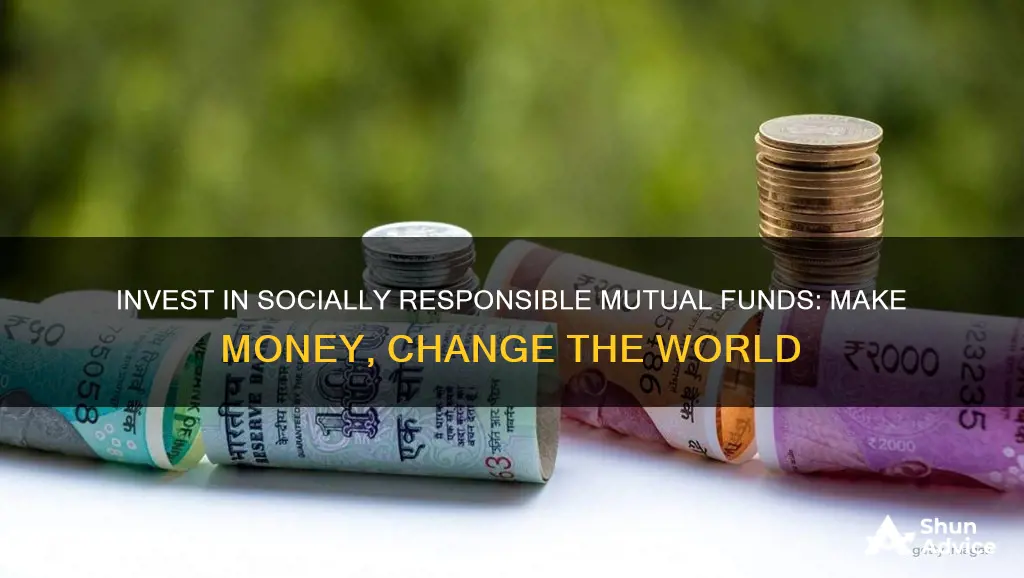
Socially responsible investing (SRI) is an investment strategy that aims to generate both positive change and financial returns. SRI investors pay attention to corporate governance, environmental impact, and human rights, among other factors. They also consider whether a company's revenue sources and business practices align with their values. SRI funds typically hold securities in companies that adhere to certain social, moral, religious, or environmental beliefs and are screened carefully to ensure the stocks chosen embody values that coincide with the fund's principles. SRI can be achieved through mutual funds or exchange-traded funds (ETFs), with the former being the focus of this article.
What You'll Learn

Environmental, Social, and Governance (ESG) funds
ESG funds can be incorporated into an investment portfolio in several ways, such as through mutual funds or exchange-traded funds (ETFs). When considering ESG funds, it is important to evaluate the quality of the fund, including its costs, risks, performance potential, and the experience of the investment team.
There are various approaches to ESG investing:
- Values-based investing or negative screening: This approach focuses on excluding companies that do not align with the investor's values.
- Integration: This approach aims to improve the risk/return profile by considering ESG risks in the investment process. Portfolios are constructed by selecting companies that score well on material ESG issues relevant to their sector.
- Impact investing: This approach explicitly deploys investment capital to achieve a desired outcome, such as making a positive impact on the world or the environment.
When choosing an ESG fund, it is essential to consider your specific values, beliefs, and investment goals. Different funds may weight environmental, social, and governance factors differently, so it is important to review the fund's disclosure documents, prospectus, and shareholder reports to understand its investment strategy and how it aligns with your values.
Additionally, it is important to be aware of "greenwashing," where fund managers exaggerate the extent to which their funds consider environmental and sustainability factors. When evaluating ESG funds, look for those that provide transparent information about their ESG practices and how they affect fund performance and risk.
Some examples of ESG funds include:
- IShares ESG Aware MSCI USA ETF (ESGU)
- IShares Global Clean Energy ETF (ICLN)
- Putnam Sustainable Leaders (PNOPX)
- TIAA-CREF Social Choice Equity (TICRX)
- Parnassus Mid Cap Fund (PARMX)
Vanguard Funds: Investing in the Future with FAANG
You may want to see also

Values-based investing
When constructing a values-based investment portfolio, investors can outline specific values or beliefs they want to incorporate. For example, investors passionate about the environment may focus on investing in green energy sources, such as wind and solar companies. Those committed to supporting marginalised groups may invest in women-run companies or hold stock in Black-owned businesses.
Values-based investors can also choose to divest from companies that do not meet their standards. For instance, an investor may choose to divest from a company that mistreats LGBTQ+ employees or does not meet environmental standards.
To make informed decisions, investors can refer to independent research firms, such as Morningstar, which provide ratings on the social responsibility of companies. Additionally, investors can review a company's sustainability report, assess the diversity of its board of directors, and consider employee reviews through third-party sites like Glassdoor.
Invest Like a Billionaire: Accessing Bill Ackman's Strategies
You may want to see also

Integration
When using the integration strategy, it is important to outline what is important to you as an investor. For example, are you passionate about the environment, or do you care about supporting the advancement of marginalized groups? Knowing what industries you are and are not willing to support will make it easier to include or exclude certain investments.
It is also crucial to research your investments carefully. Two types of investments to consider for a sustainable portfolio are stocks and funds. Individual stocks generally should not make up more than 5% to 10% of your portfolio, but you may want to include a particular company if you expect strong growth. In addition to factors like revenue and net income, you may want to review a company's sustainability report, the diversity of its board of directors, and how employees grade the work culture through third-party sites.
Mutual funds are another option for investors seeking to integrate ESG factors into their portfolios. Mutual funds include selected assets that adhere to criteria laid out by the fund manager. Some funds have specific focus areas, such as advancing women in leadership or investing in companies that are fossil-fuel-free. When considering a mutual fund, it is important to review the fund's prospectus, holdings (a list of companies the fund is invested in), and expense ratio. While some funds labeled as socially responsible have higher expense ratios, there are also many funds that are similar in cost or cheaper than traditional funds.
A Beginner's Guide to Hedge Fund Investing
You may want to see also

Impact investing
When it comes to impact investing in socially responsible mutual funds, investors can choose from a variety of funds that align with their values. These funds generally hold securities in companies that adhere to certain social, moral, religious, or environmental beliefs. To ensure alignment, company issuers undergo a careful screening process.
- IShares ESG Aware MSCI USA ETF (ESGU): This fund focuses on large-cap stocks that operate in a socially responsible way, including tech companies like Microsoft and Nvidia.
- IShares Global Clean Energy ETF (ICLN): This fund invests directly in companies that are helping with decarbonization and fighting climate change, including First Solar and Vestas Wind Systems.
- Putnam Sustainable Leaders (PNOPX): This fund purchases companies that demonstrate leadership in sustainability issues that are financially material to their business context, such as Apple and UnitedHealthGroup.
- TIAA-CREF Social Choice Equity (TICRX): This fund gives special consideration to environmental, social, and governance criteria and holds a diverse portfolio of nearly 450 stocks, including Microsoft and Nvidia.
- Parnassus Mid Cap Fund (PARMX): This fund provides an opportunity to invest sustainably in mid-sized companies, including Cboe Global Markets and Roper Technologies.
- IShares ESG Aware MSCI EAFE ETF (ESGD): This fund focuses on socially responsible firms outside the US, including Danish healthcare leader Novo Nordisk and German technology giant SAP.
When considering impact investing in socially responsible mutual funds, it is important to assess the quality of the fund, including its costs, risks, performance potential, and the experience of the investment team. It is also crucial to ensure that the fund's objectives and strategies align with your values and desired outcomes.
Bond Index Funds: Choosing the Right Investment for You
You may want to see also

Shareholder activism
SRI funds use their ownership rights to influence management through policy-change suggestions. This is achieved by attending shareholder meetings, filing proxy proposals, writing letters, meeting with management, and exercising voting rights. Due to the difficulty of individual shareholders exercising their votes, voting is often achieved by proxy, with fund shareholders assigning management to vote on their behalf.
Shareholder activists are also making their mark on mergers and acquisitions. A 2015 survey found that 60% of corporate development leaders witnessed shareholder activism affecting transaction activity in their industry.
In terms of non-financial goals, shareholders are increasingly seeking to influence companies' environmental and social performance. Organizations such as the Interfaith Center on Corporate Responsibility (ICCR), As You Sow, and Ceres use shareholder resolutions and other means to address issues like sustainability and human rights.
Shareholders can also introduce a shareholder resolution, although the SEC has increased the share value required to do so. Currently, if shares are owned for one year, they must be worth $25,000 to file a resolution; if shares are owned for two years, the value is $15,000; and if shares are owned for three years, the value must be at least $2,000.
Social Security Funds: Risky Business or Smart Investing?
You may want to see also
Frequently asked questions
Socially responsible investing (SRI) is an investment strategy that aims to generate both social change and financial returns for an investor. SRI investors pay attention to corporate governance, environmental impact, and human rights, among many other factors.
Some examples of socially responsible mutual funds include iShares ESG Aware MSCI USA ETF (ESGU), iShares Global Clean Energy ETF (ICLN), and Parnassus Mid Cap Fund (PARMX).
First, decide how much help you want and choose between building your own SRI portfolio or using a robo-advisor. If you choose to build your own, you'll need to open a brokerage account, outline your values and priorities, and research investments that align with your values.







